Bhutan's King Jigme Singye Wangchuk had the vision to give his people what they wanted - happiness and democracy. He had been thinking about this at least as early as the beginning of this century and his sagacity determined that it is best to give to people what they want before they try to snatch it.
The pursuit was for democracy and Gross National happiness. Thus, in 2006, he abdicated in favour of his son and His Majesty Jigme Khesar Namgyal Wangchuk ascended the throne in 2008. Bhutan held its first democratic elections the same year. Since then, Bhutan has recently held its third consecutive and peaceful election that has led to another peaceful transfer of power. By all accounts, a remarkable feat considering that some other countries have been struggling to have democratic practices firmly in position despite years of democracy moves. Nepal and Pakistan are two of them.
The People's Democratic Party, in power since 2013 lost in the first round of elections in September and the Druk Nyamrup Tshogpa won with 30 of the 47 seats, while its rival, Druk Phuenseum Tshogpa (DPT) got the remaining 17 seats in the second round of elections. Clearly, the Bhutanese were trying at all three major parties having elected the DPT in 2008 and PDP in 2013. India may be the elephant in the room for Bhutanese (the other being China) but it was not a factor in the last elections. In 2013, Bhutan faced a sudden fuel price escalation after India withdrew subsidies on kerosene and cooking gas. It was restored soon enough and explained away as an "unfortunate technical lapse" but the idea was to convey New Delhi's unhappiness to the DPT.
A year earlier, in 2012, Bhutanese Prime Minister Jigme Thinley had gone and met the Chinese prime minister at Rio de Janeiro. New Delhi was playing regime manager, by trying to bat for the challenger, the PDP. This was successful but only for one term as the PDP lost in October 2018. Regime management is a particularly hazardous business, as the US knows from its vast experience.
The DNT (/search?query=DNT) had fared rather dismally at the last elections was the surprise winner in 2018 when external and security issues took a back seat during the campaign. The winner has been concerned with an export basket where hydropower dominates and an economy driven by investments in this sector. Further, 75 per cent of the country's external debt is accounted by hydropower loans. India accounts for 80 per cent of Bhutan's exports. India's sudden withdrawal of subsidy in 2013 was another lesson. The party's leader, Lotay Tshering, would like to diversify this dependence. It is also unlikely that Bhutan will sign the BBIN motor vehicles agreement any time soon.
It is commonly understood that while internationally, sovereignty is equal, except in the UN; power is definitely unequal. Bhutan is located between two massive giants who have border issues that are exacerbated by incidents like the Doklam standoff last year. There are two elephants in the small room with their populations and militaries. Before we consider other means to persuade Bhutan to see things our way, it is important to look at how Bhutan looks at itself. Both China and India were in this case protecting their interests in territory that is disputed between China and Bhutan. India's move into Doklam, without consulting the Bhutanese government was seen as presumptuous, and worrying, in Bhutanese circles. China's rowing military and economic power would not have escaped Bhutanese perceptions. They would have seen the Chinese militarily confronting the US in the South China Sea and better able to defend or promoting its national interests
Bhutan would look at other points of difference between India and China - the Tawang issue, Chinese attitude towards His Holiness Dalai Lama, India-China and Arunachal Pradesh, and see themselves caught up between India and China. It is in a way, suffocating for the Bhutanese. Obviously, the Bhutanese feel they need space. The trouble with an excessively exclusive relationship between two neighbours who are mismatched in power and reach is that the stronger neighbour tends to get overbearing and at times patronizing without meaning to. India must at all times guard against this.
Inevitably, the Bhutanese will consider ways and means of establishing formal diplomat relations with China. Chinese goods now constitute one-third of Bhutanese consumer imports. They are aware of the increasing Chinese footprint in the region and it would not be surprising if the DNT may initiate some tentative moves for this. A full-blown relationship with China without sorting border issues could be risky for Bhutan and may not be easy.
India-Bhutan relations are entering a crucial and delicate phase. These will have to be skillfully handled with maturity and trust in the context of evolving trilateral relations - between India-Bhutan, Bhutan-China and India-China. India will have to cultivate all political parties equally assuring them that India would not play favourites, and take care not to allow minor irritants take centre stage. India needs to assure Bhutan that India Bhutan relations are stand-alone and India does not see Bhutan through a Chinese prism.
When the power differential between two countries is very large there is always the danger that the bigger power may become overbearing or appear overbearing without meaning to. When such perceptions take root, sensitivities increase and there are many number of forces seeking to sharpen these perceptions. India must guard against this. India has its security interests as well. Social media will inevitably come to Bhutan in a big way. It would be tragic if all Indian efforts for a balanced relationship were to be perceived being those of an Ugly Indian.
This commentary originally appeared in ANI.
The views expressed above belong to the author(s). ORF research and analyses now available on Telegram! Click here to access our curated content — blogs, longforms and interviews.




 PREV
PREV



